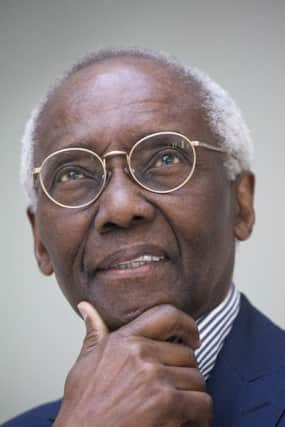Attitudes to racism in Scotland ‘rolling backwards,’ experts warn


They have warned of a climate of “resentment towards frank discussion of race and racism” is threatening to undo progress on race equality.
They have also suggested there is a trend in Scotland that seeks to “silence the voices of people in Scotland who face colour-based racism.”
Advertisement
Hide AdThe letter calls into question current public sector efforts to tackle racism and also claims it is “blatantly unfair” to suggest the risk of inequality and discrimination on the grounds of race is equally applicable to everyone in Scotland.
Signatories include lawyer Aamer Anwar, playwright Hannah Lavery, visual artist Sekai Machache and the academic and human rights activist Sir Geoff Palmer, as well as representatives of Migrants’ Rights Scotland, the Edinburgh Caribbean Association, the Glasgow Equality Forum and Scotland Against Criminalising Communities.
The letter has been published less than two months after the Scots Makar, Jackie Kay, warned that Scotland had to “grow up” and take more responsibility for the treatment of black and ethnic minority people.
The letter states: “Between us, we have many decades of experience in researching, teaching, studying and advocating for racial equality.
“We have differing experiences and, in some ways, differing views on race and racism. However we join together to express our shared concern that understandings of race and racism in Scotland are rolling backwards.
“The current climate of resentment towards frank discussion of race and racism threatens to undo progress on race equality. This expands beyond attempts to police legitimate work to challenge racial inequality, into the policy-making arena.
Advertisement
Hide Ad“Everyone is protected by law from racial discrimination on the grounds of their colour, nationality and ethnic or national origins, as is fair and just. However, it is blatantly unfair to suggest the risk of inequality and discrimination on the grounds of race is equally applicable to everyone.”
The open letter has been circulated on social media in the wake of controversy over claims that white people were banned from asking questions at an anti-racism meeting staged by Edinburgh University students so that people of colour were prioritised.
Advertisement
Hide AdThe open letter also states: “Policy approaches must take into account the history of racialisation and current experience of discrimination, which creates worse outcomes for people from specific ethnic backgrounds in specific areas of life.
“Solutions cannot be reached without discussing how racism operates as a social and institutional structure, fuelled by protections and advantages people perceived as white have received over time and in the present day.
“White people have a vital role to play in creating the culture change needed to eradicate racism. However, just as there is a time for speaking out and challenging racism, there must be time for listening, learning and reflecting on the experiences of those facing racism. These discussions may be uncomfortable, but they’re necessary.”
The Scottish Government’s equalities minister, Christina McKelvie, said: “Racism and discrimination have no place in a modern and successful Scotland and we will continue to take decisive action to tackle it.
“The Equality Act 2010 defines race as colour, ethnicity and nationality. However, we know different minority communities may experience racism in different ways. We all have a responsibility to challenge racism wherever we encounter it, whether it be hate crime or systematic and institutionalised racism.
“We must remove these barriers so everyone can fully participate equally as active citizens and benefit from Scotland’s diverse culture and economy.
Advertisement
Hide Ad“Our Race Equality Framework, which sets out our long-term goals, and the Race Equality Action Plan outlines more than 120 actions we are taking over the course of this Parliament to secure better outcomes for minority ethnic communities in Scotland.
“We are also actively working with the organisations in Scotland on these issues.”